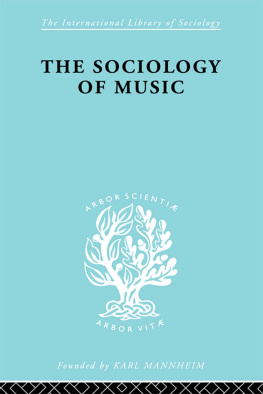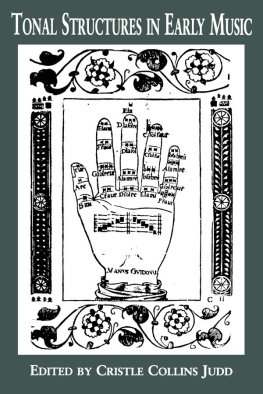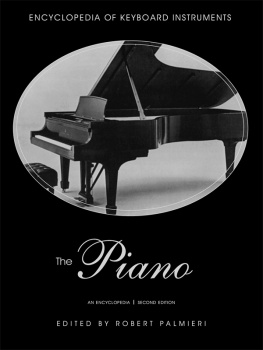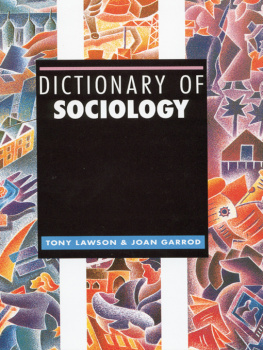THE EARLY SOCIOLOGY OF CULTURE
THE EARLY SOCIOLOGY OF CULTURE
VOLUME I
Old World Traits Transplanted
Robert E. Park and Herbert A. Miller
VOLUME II
The Taxi-Dance Hall: A Sociological Study on Commercialized Recreation and City Life
Paul G. Cressy
VOLUME III
The Mind and Society
Part One: Non-Logical Conflict
Vilfredo Pareto
VOLUME IV
The Mind and Society
Part Two: Analysis of Sentiment
Vilfredo Pareto
VOLUME V
The Mind and Society
Part Three: Sentiment in Thinking
Vilfredo Pareto
VOLUME VI
The Mind and Society
Part Four: The General Form of Society
Vilfredo Pareto
VOLUME VII
The Elements of Folk Psychology : Outlines of a Psychological History of the Development of Mankind
Wilhelm Wundt
VOLUME VIII
Culture and Progress
Wilson D. Wallis
First published 1921 by Harper & Brothers, New York and London
This edition published 2003 by Routledge
2 Park Square, Milton Park, Abingdon, Oxon, OX 14 4RN
Simultaneously published in the USA and Canada
by Routledge
270 Madison Ave, New York NY 10016
Routledge is an imprint of the Taylor & Francis Group
Transferred to Digital Printing 2007
Copyright 1921; by Harper & Brothers.
Editorial Matter and Selection 2003 Kenneth Thompson.
Typeset in Times New Roman by Keystroke, Jacaranda Lodge, Wolverhampton Printed and bound in Great Britain by TJI Digital, Padstow, Cornwall
All rights reserved. No part of this book may be reprinted or reproduced or utilised in any form or by any electronic, mechanical, or other means, now known or hereafter invented, including photocopying and recording, or in any information storage or retrieval system, without permission in writing from the publishers.
British Library Cataloguing in Publication Data
A catalogue record for this book is available from the British Library
Library of Congress Cataloging in Publication Data
A catalog record for this book has been requested.
ISBN 0415279379 (Set)
ISBN 0415279747 (Volume I)
Publishers Note
The publisher has gone to great lengths to ensure the quality of this reprint but points out that some imperfections in the original book may be apparent.
THE MAKING OF SOCIOLOGY
Founding editor: Bryan S. Turner, University of Cambridge
Series editor: Kenneth Thompson, Open University
THE EARLY SOCIOLOGY OF CLASS
Edited with a new introduction by Bryan S. Turner
8 volume set
THE EARLY SOCIOLOGY OF RELIGION
Edited with a new introduction by Bryan S. Turner
9 volume set
SOCIAL THEORIES OF THE CITY
Edited with a new introduction by Bryan S. Turner
THE EARLY SOCIOLOGY OF THE FAMILY
Edited with a new introduction by Bryan S. Turner
10 volume set
ORIENTALISM: EARLY SOURCES
Edited with a new introduction by Bryan S. Turner
12 volume set
THE EARLY SOCIOLOGY OF HEALTH AND ILLNESS
Edited with a new introduction by Kevin White
6 volume set
THE EARLY SOCIOLOGY OF CULTURE
Edited with a new introduction by Kenneth Thompson
8 volume set
THE EARLY SOCIOLOGY OF MANAGEMENT AND ORGANISATIONS
Edited with a new introduction by Kenneth Thompson
8 volume set
INTRODUCTION TO THE EARLY SOCIOLOGY OF CULTURE
By Kenneth Thompson
Since the late 1970s there has been a tendency within sociology that has been described as the cultural turn. It is taken to refer to an increased importance that is being given to cultural phenomena and cultural factors in sociological explanation. The claim is made that this is a new departure, whereas previously, culture was regarded as being subordinate to, or of less significance than, other factors, such as material and social structures or social relations and forms of organization. This subordination of culture or its dependency on other factors was particularly associated with various forms of economic determinism, such as classical economic theory, and even more prominently the historical materialism of Marxism and the base/superstructure model, according to which cultural phenomena were regarded as determined in the last instance by material factors, especially economic factors. In mid-twentieth century functionalist anthropology and sociology, social structure was often given pre-eminence and there was a concentration of the way in which ideology (e.g. religion and ritual) had the function of maintaining social solidarity (A. R. Radcliffe-Brown), providing a charter for the social order (Bronislaw Malinowski), or pattern-maintenance (Talcott Parsons). The case of Talcott Parsons, who was the most important figure in mid-twentieth century sociology, is particularly interesting, as we will see, because in his early work he managed to combine a structural-functionalist system model with a new emphasis on cultural factors, thus combating the dominance of economic utility theories at that time.
However, although it is incontrovertible that the post-1970s cultural turn has given culture a new significance, partly in recognition of the increased signifcance of the culture industries in the economy of the more economically advanced societies, and to various cultural revolutions (not just the so-called Chinese Cultural Revolution, and the Events of 1968, but also the intellectual movements of structuralism and post-structuralism, postmodernism, etc.), there has been a tendency to forget the centrality of debates about culture in the early days of anthropology and sociology. Culture occupied a major part, if not the central part, of early sociological and anthropological writings towards the end of the nineteenth century and in the early decades of the twentieth century, when the sociology of culture was in its infancy. The approaches taken were extremely varied and so one of the aims of this set of books on The Early Sociology of Culture is to reflect some of that diversity. It also aims to make available some representative works that have become difficult to acquire, but which do not deserve to be forgotten. Indeed, it is important for the history of ideas, in relation to the sociology of culture, that they should receive due recognition. The approaches vary from social evolutionary approaches to the development of human culture in general, to other efforts to lay the foundations for a science of sociology that included cultural phenomena, and the pioneering of methods such as ethnography and documentary research in modern urban areas, such as Chicago and New York.
Although mainly set in New York and not Chicago, one of the first major research works from the soon to be famous, Chicago School of Sociology, was that by Robert E. Park and Herbert A. Miller, Old World Traits Transplanted, New York and London, Harper & Brothers, published in 1921. In this remarkable work, Park and Miller provide a deft combination of theory and empirical data (particularly, interviews and letters of immigrants) in analysing the ways of life and the problems faced by immigrants into the United States early in the twentieth century and of the assimilation or4 American isati on of those immigrants. The work was part of a series of research monographs funded by the Carnegie Corporation of New York; the other volumes covered a range of topics: Schooling of the Immigrant; The Press; Adjustment of Homes and Family Life; Legal Protection and Correction; Health Standards and Care; Naturalisation and Political Life; Industrial and Economic Amalgamation; Treatment of Immigrant Heritages; Neighbourhood Agencies and Organisation; Rural Developments; and a Summary volume. This volume on






